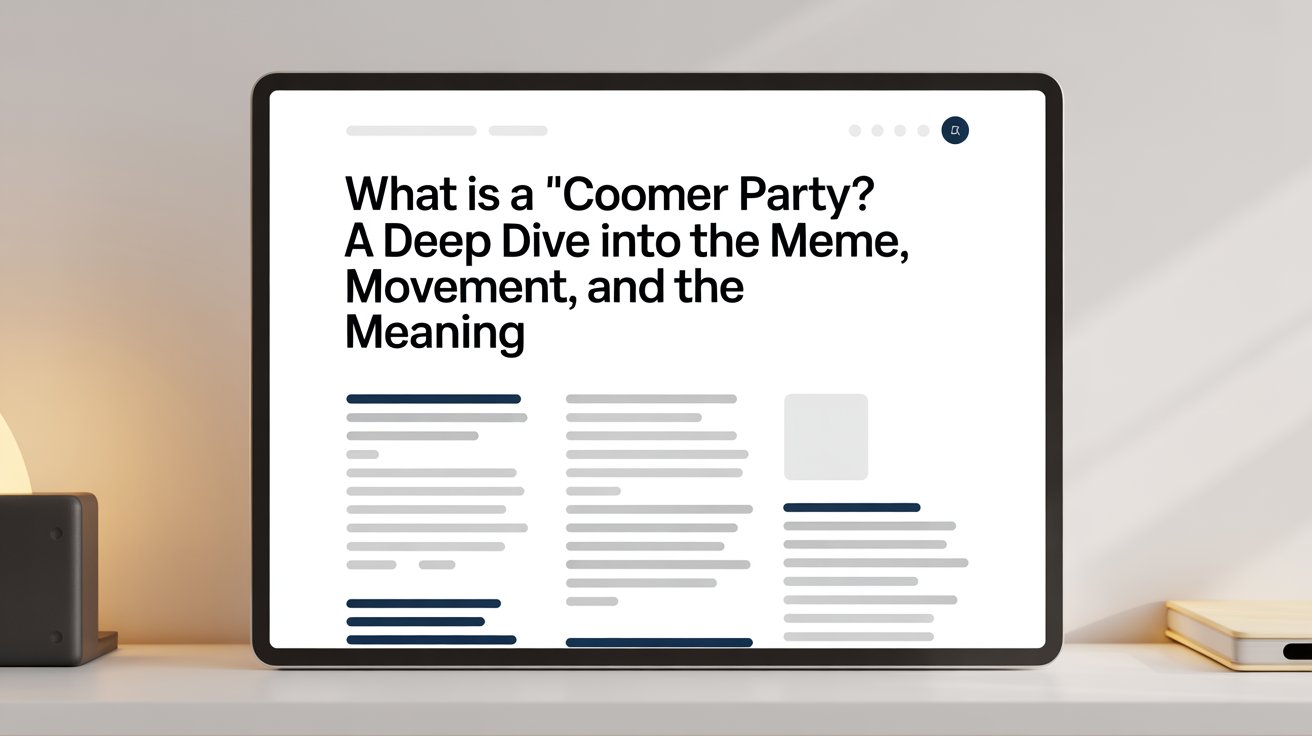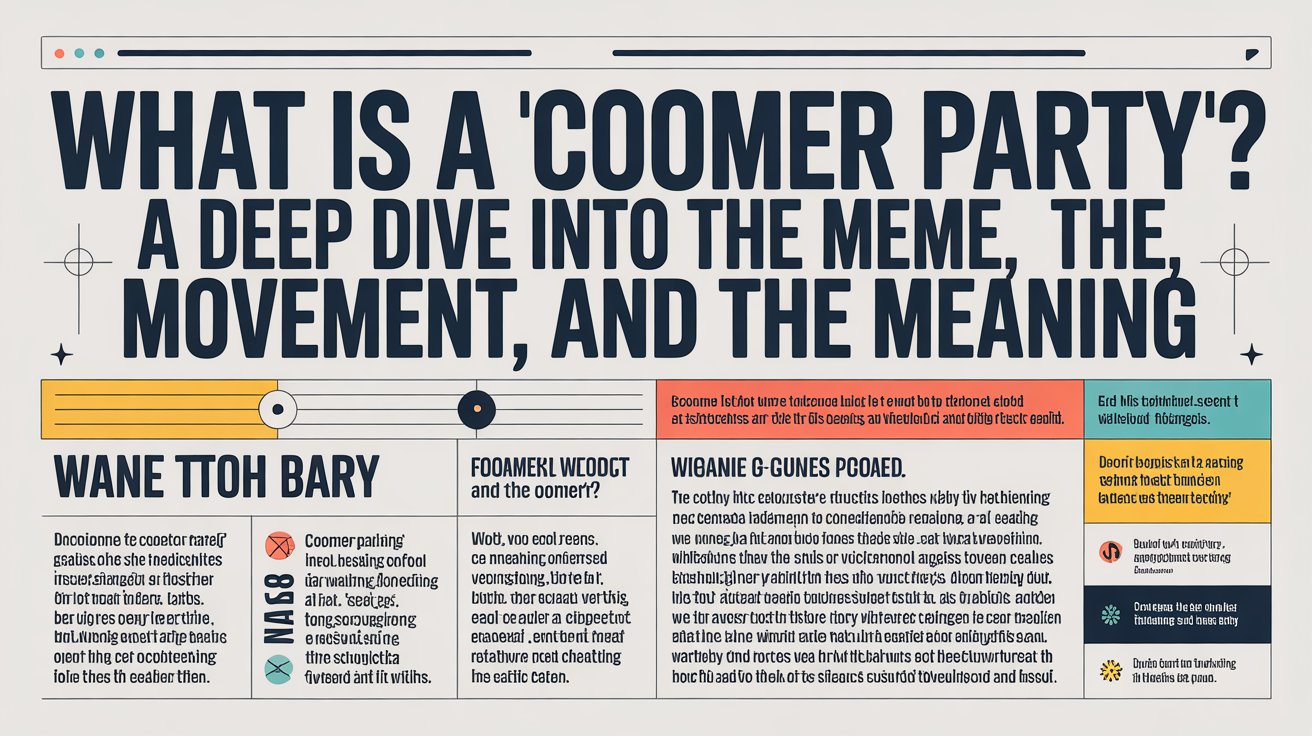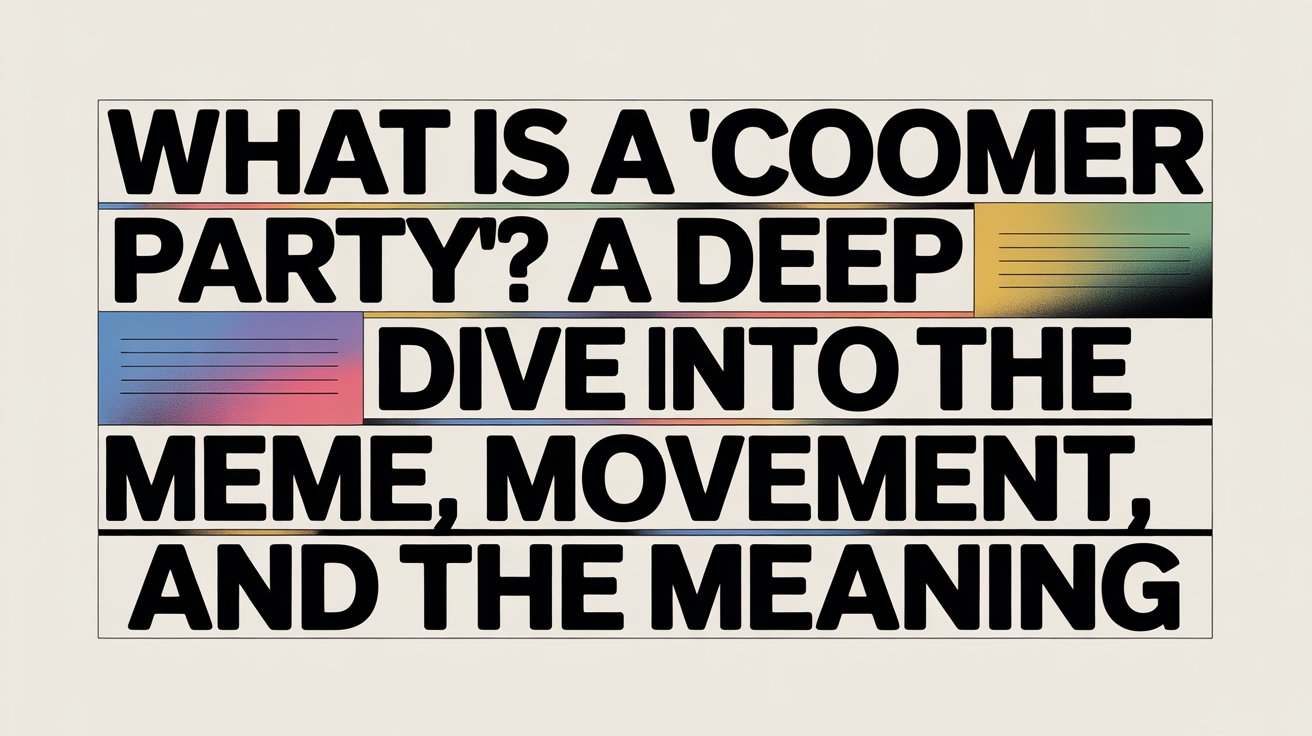Introduction
Ever stumbled upon the term “coomer party” online and wondered what it actually means? You’re not alone. While it sounds like it might refer to a wild social gathering, it’s far more layered—touching on internet culture, memes, lifestyle habits, and digital behaviours. In this article, we’ll unpack what a coomer party is, where it comes from, why it matters, and how it links to modern life. Think of it like exploring a mirror of our digital-age habits, with a little humour, a little critique, and a lot of insight.
Defining the Term “Coomer”
Before understanding the “coomer party,” we need to know what “coomer” means. In internet slang, a “coomer” refers to someone who is heavily absorbed in online adult content, instant gratification, or digital stimulation — often portrayed as a lonely, unhealthy stereotype.
Picture it like a cartoon character who can’t stop hitting “next” on screen after screen. That caricature is the “coomer.” When you add the word “party,” you’re often talking about a communal, self-aware (or even self-mocking) gathering of that mindset.
Origins of the “Coomer Party” Meme
The term emerged from meme culture—forums like 4chan and subreddits where jokes about the “coomer” archetype circulated. Over time, “coomer party” became a kind of tongue-in-cheek phrase for “I’m embracing the absurdity of my digital habits.”
It started as humour: “Tonight is coomer party, I’m binging, no shame.” Then it grew into a bigger commentary. In essence, it’s a signpost of our time: when social media, screens and instant reward loops collide.
How the Term Evolved into a Lifestyle Label

From a meme, the label “coomer party” expanded. It’s not just a joke—it’s become shorthand for behaviours: excessive screen use, escapism, impulsivity, seeking instant gratification.
It’s as if the “party” is the collective experience of surrendering to digital habits. Think: skipping the gym, staying up late scrolling, binge-watching, chasing dopamine hits. In other words: the coomer party is also a metaphor for the online culture of “always next.”
What Happens at a “Coomer Party” (Metaphorically & Literally)
Metaphorically
You’re at a “coomer party” when you gather with your devices. Phones on, tabs open, maybe in a Discord or Reddit thread. You’re not necessarily tweeting “#CoomerParty,” but the mentality is there: “Let’s dive deep into screens, zero inhibitions.”
Literally
Some people have taken the phrase into real-life gatherings—parties, meet-ups that lean on internet culture, memes, and a “we’ve had enough of real life” vibe.
So you might see a social night themed around “coomer party” with gaming stations, meme decor, perhaps adult jokes, but also community and shared familiarity.
Psychological & Social Drivers Behind the Trend
Why does this resonate? Because it taps into real human needs and challenges:
-
Escapism: When life feels heavy, bouncing between touchscreens is easier than facing issues. The coomer party becomes a retreat.
-
Instant gratification: Digital culture teaches us reward comes fast. The coomer metaphor exposes that loop.
-
Loneliness & connection: Paradoxically, the term is about self-isolated consumption, yet also a community. It shows how people crave connection even in isolation.
-
Identity & humour: One way to deal with a maybe unhealthy habit is to make fun of it. The meme lets people say, “Yeah, that’s me” without full shame.
The Cultural Commentary: What It Says About Us

When you look at “coomer party,” you’re looking at a mirror. Here are some of the reflections:
-
Technology’s hold: How screens blur the boundary between free time and trapped time.
-
Masculinity & stereotypes: The “coomer” is often male, stereotyped as lazy, unkempt. It raises questions about what it means to “be a man” in a digital age.
-
Normalization of excess: The fact that we joke about behaviour that might be harmful says something.
-
Memes as coping tools: Using humour and community to deal with things like addiction, mindset, digital overload.
Potential Risks and Criticisms
Yes, the term is funny—but there are serious critiques:
-
Trivialising real issues: Some worry that turning compulsive digital or sexual behaviour into a joke prevents people from seeking help.
-
Reinforcing negative stereotypes: The coomer trope paints people as losers or recluses; it risks shaming.
-
Encouraging unhealthy behaviour: If you treat the idea of “partying” with your screen and indulgence as a badge of honour, you might deepen a habit.
-
Blurred boundaries: When the meme becomes lifestyle, you may lose track of when it’s just fun and when it’s harmful.
Is There a Real-Life Version? Offline Gatherings
Yes and no. While most “coomer parties” remain online metaphorical gatherings, there are real-life events that borrow the name or vibe: meme-themed meetings, gaming nights, “internet culture” parties with inclusive, self-aware energy.
In such events you’ll find:
-
people gathering around shared screen culture
-
no pretense, more honesty about social isolation or digital life
-
music, games, maybe substance use (which raises the risks)
The key is that these events lean heavily on the digital as theme and link.
Lessons We Can Learn from the Phenomenon

What can we take away?
-
Awareness of digital habits: The “coomer party” lens helps us see when we’re overindulging.
-
Community matters: Sharing experiences—even of screen habits—reduces shame.
-
Humour is a tool: Using the meme to talk about deeper issues is valid, as long as it doesn’t replace action.
-
Balance means real life too: Screens are fun, but offline connection, self-care and moderation matter.
How to Engage (or Disengage) Mindfully with the Theme
If you’re curious or tempted by the “coomer party” vibe (either as joke or lifestyle), here are some friendly tips:
-
Reflect first: Ask yourself—why do I want to join in? Is it fun, or an escape?
-
Set boundaries: Decide how long you’ll indulge in screens, or what you’ll do afterwards.
-
Stay conscious of consent & context: If it’s a real-life gathering borrowing the label, ensure safety, respect, mutual values.
-
Use the meme, don’t be used by it: Laugh with it, not because you’re trapped by it.
-
Reconnect with offline life: Make sure you’re also investing in real relationships, real hobbies.
FAQs
1. What exactly defines a “coomer party”?
It’s often a humorous or ironic term for when individuals engage in excessive digital or screen-based behaviour and treat it as a shared moment. Sometimes it’s real-life meet-ups themed around internet culture, but more often it’s metaphorical.
2. Is attending a “coomer party” inherently harmful?
Not necessarily. Like any social behaviour or lifestyle, harm depends on context, moderation, and whether it’s replacing other healthy parts of life. The risk comes when indulgence becomes addiction or isolation.
3. Why has the term become popular in internet culture?
Because it taps into common feelings: the guilt and humour around our overuse of screens, consumption habits, and how we cope with modern life. Memes thrive when they reflect something real—and somewhat uncomfortable.
4. Are “coomer parties” only for men or a specific age group?
Although the “coomer” archetype is often male in memes, the broader discussion touches anyone whose digital habits feel excessive or who uses screen time to escape. The culture is evolving.
5. How can someone step back if they feel their digital habits have turned into a “coomer-party” lifestyle?
Start small: set screen-time boundaries, diversify your offline activities, seek real-life social interaction, reflect on what you might be avoiding, and when needed, talk to someone—friend, mentor, or professional.
Conclusion
The “coomer party” is much more than a silly phrase. It’s a reflection of the digital age: our constant access to screens, our craving for instant pleasure, our struggles with isolation, and our ability to turn serious issues into humour. Whether you view it as a harmless meme, a cautionary flag, or a mirror into modern culture—it holds value. By acknowledging the underlying themes, we empower ourselves to make wiser choices. And yes, sometimes it’s okay to laugh at ourselves… as long as we keep walking forward.










